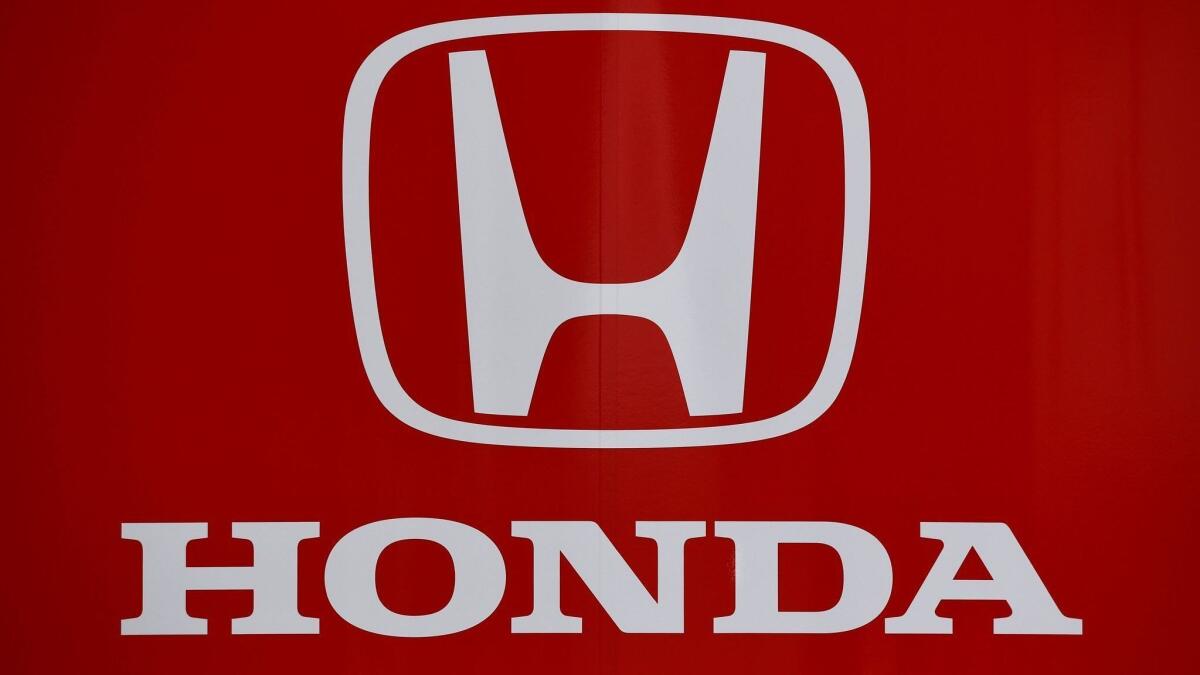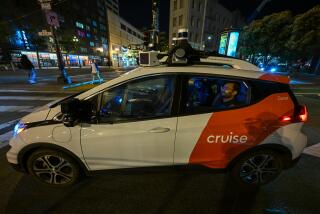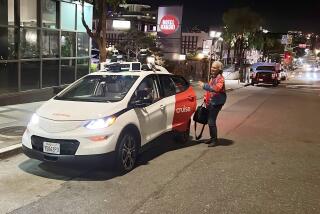Honda joins forces with GM to bring self-driving vehicles to market

General Motors Co.’s self-driving car unit drew its second major investment in a matter of months, with Honda Motor Co. committing to spend $2.75 billion on backing the company and joining forces to bring autonomous vehicles to market.
Honda’s partnership will strengthen GM’s position as one of the front-runners in the packed race to bring self-driving vehicles to market. The Japanese carmaker will make a $750-million equity investment in GM Cruise, plus spend $2 billion over 12 years on jointly developing and deploying autonomous vehicles, according to a statement.
GM shares jumped after the investment from Honda, which will get a 5.7% stake in Cruise. The U.S. carmaker is a serious contender along with Waymo, Alphabet Inc.’s Google autonomous-vehicle unit. Analysts at Morgan Stanley have pegged the potential enterprise value of Waymo — widely perceived to be a leader in the space — at $175 billion.
“It’s a clear indicator that market consolidation has begun,” said Grayson Brulte, co-founder of the autonomy consulting firm Brulte & Co., in an interview. “The autonomous ecosystem is not a winner-takes-all scenario and we don’t need 20 different autonomous systems. Partners will have to be on the same team with a common goal of deploying multiple types of autonomous vehicles based on consumer wants and needs.”
GM’s stock gain of as much as 5.3% Wednesday was the biggest intraday jump since May 31, the day Cruise got a $2.25-billion investment from SoftBank Vision Fund. The stock was up 2% to $33.97 as of 10:16 a.m. in New York.
The deal with GM and Cruise is exclusive, Honda Chief Operating Officer Seiji Kuraishi said on a conference call with reporters. That raises questions about what happened to Honda’s plans to work with Waymo. Although the two companies announced talks in late 2016, details of what the two would do together have been sparse.
Kuraishi wouldn’t discuss what happened to negotiations between Honda and Waymo during the call.
Honda’s investment values Cruise at $14.6 billion, up from $11.5 billion when SoftBank made its initial wager this year. Cruise’s worth has been on the rise since GM acquired the company about two years ago for $581 million in cash. Adding in bonuses and other payments to key employees, the deal was said to have cost the company closer to $1 billion.
The new partnership has the potential to boost the global scale of GM’s self-driving car technology and accelerate deployment of autonomous vehicles for Honda. The two automakers will develop a self-driving model that can be used in a variety of ways and will be deployed in a Cruise autonomous network.
GM will manufacture the car, which will be an electric vehicle, GM President Dan Ammann said. The companies haven’t decided what kind of vehicle they will jointly build, he said.
GM is still racing to deploy self-driving cars in a ride-hailing service in the U.S. next year, Ammann added. That car is based on GM’s electric Chevrolet Bolt.
Honda and GM already collaborate on battery technology and hydrogen fuel cells. The carmakers could even develop a self-driving car using hydrogen fuel cell technology, though no decision to do so has been made, said Mark Reuss, GM’s executive vice president of product development.
It would make sense, Reuss said, because a car with a set route in a limited area could have a hydrogen fueling station placed strategically in the area. Since fuel cells can refuel much faster than electric cars, it could be a good solution, he said.
“The pieces are all there,” Reuss said. “The refueling times would be much smaller.”
Earlier this year, GM met with investment bankers to look at long-term future options, such as issuing a tracking stock to list shares in Cruise or to eventually sell stock to the public. No decision was made at the time as GM was evaluating future options, people familiar with the matter said then.
Welch writes for Bloomberg.
UPDATES:
9:10 a.m.: This article was updated with more details about GM Cruise and comments from GM executive Mark Reuss and consultant Grayson Brulte.
This article was published at 7:30 a.m.
More to Read
Inside the business of entertainment
The Wide Shot brings you news, analysis and insights on everything from streaming wars to production — and what it all means for the future.
You may occasionally receive promotional content from the Los Angeles Times.










